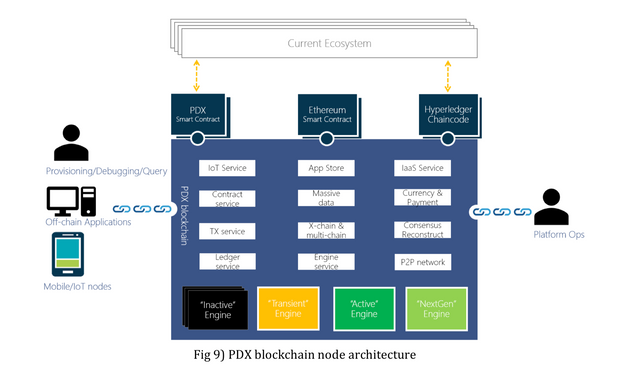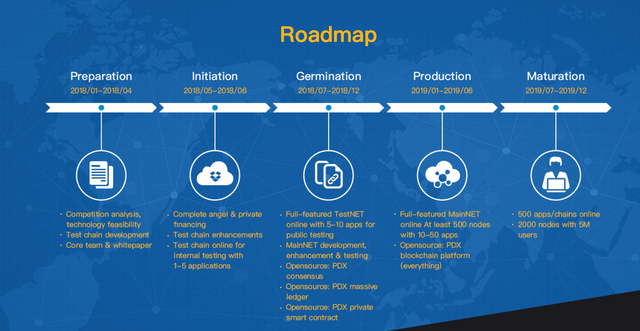Website: http://pdx.link/
Whitepaper: http://pdx.link/whitepaper/pdx-whitepaper-0.4.1-en.pdf
What is it:
PDX aims to build a public blockchain, based on PDX BaaP (Blockchain-as-a-Platform) with architecture that separates business logic from trust establishment.
PDX claims a dedicated chain and smart contracts can be created with a single-click using its interface/deployment templates allowing developers/companies to create secured dApps using its fully private and fully secure smart contracts. A separate dedicated chain gets created in the ecosystem for every application with specific characteristics from the public chain as requested and the high performance distributed PDX consensus and blockchain ledger algorithm supports scaling, low latency and high throughput.
PDX exposes a web based easy to use IaaS interface for the small to medium sized companies to build dApps and to port existing dApps without big efforts. PDX is also building an “App Store” for developers to build dApps and has got Incentivization models for developers building the dApps in the ecosystem based on their PoA (Proof-of-Activeness) and PoC (Proof-of-Contribution).
PDX has built an exchange for the currencies issued by each dedicated chain or issued by the applications in other words to get listed and traded within the ecosystem with minimal listing and transaction fees. There are also has plans to extend the blockchain and smart contract support to mobile devices and IoT in the future.
PDX has applied patents for smart contract architecture, supporting fully private and fully secure smart contracts, blockchain ledger and high performance distributed consensus algorithms.
Architecture:
PDX architecture is formed of 3 layers, physical which is the bottom, trust in the middle and business layer at the top. Business layer is where the customer interacts and deploys the secured smart contracts onto the business chains. Trust layer is a tree like structure which gets auto adjusted by the public chain and provides trust assurance to the PDX public blockchain. Trust chain forms the main root chain in this layer and it provides the service of passing down its own hash blocks and the hash blocks received from the independent chains down to the lower levels. Also, the block evidences are also passed down the levels of ecosystem thus increasing the trust strength in the blocks aka multi-layer trust architecture. Physical layer is where the actual physical nodes are present.
PDX architecture also has different services for executing different activities and introduces the “engine” concept.
Engine Service - “engines” are serviced by the “engine service” module in the mainchain. There are 4 categories of engines:
NexGen- 1st stage
Active- 2nd stage
Transient- 3rd stage
Inactive- final stage
Smart contract service - full lifecycle of all smart contracts
Transaction service- transaction lifecycle management
IoT service- smart contract support to mobile devices or IoT smart devices
Currency & Payment- virtual currency and automated incentivization
App store – to host paid or free components built
IaaS service- visualized blockchain platform administration and monitoring
consensus reconstruct- supports three types of consensus: blockchain cluster level, application (smart contract) level and transaction (type) level

Product:
Internal Testnet available - http://wallet.pdx.link
Public Testnet in Q4 2018
Mainnet sometime in Q2 2019 and then an expansion on number of nodes and dApps before Q4 2019
Roadmap:
Good roadmap - I would rate it good except that fact that they have pulled numbers on dApps without detailing a plan to achieve that many built.

Investors:
NGC is a notable and very well-known investor
There are also raft of other names given as investors – not famous ones
Partnerships:
Cannot see any mentioned in the site
Metrics:
Hard cap at 20K ETH- Full metrics not known like token price etc., (at least to me and to the public forum)
Core Team & Advisors:
There are good experienced members but I cannot see anyone as a well-known star in the industry. I cannot see any team members with blockchain experience either.
Advisors are not all-star individuals but they do seem to have valuable experience.
Good ones:
- Only Private sale
- Very good hard cap for a blockchain project- 20,000 ETH
- NGC invested
- Extension of blockchains to smart devices- interesting one
- Incentivization models for developers building the dApps in the ecosystem based on their PoA (Proof-of-Activeness)and PoC (Proof-of-Contribution)
- They already have built 4 dApps inhouse that will go online once Mainnet is released
- There are screenshots of Blockchain nodes deployed and browser in the whitepaper – encouraging
Not good ones:
- No public sale also has the other side of the coin which is the community awareness- but PDX somehow managed to cross this bridge by doing airdrops so have got good community awareness
- They are claiming to have 500 dApps by EOY 2019- but I cannot see a plan laid out to achieve this. 500 is a lot in to do in 1 year (mainnet early 2019) so can’t take this number without a detailed plan laid out
- PDX claims they have got the chain from 2016/06/30 but not sure why they are doing the fundraising now
- 200 PDXC Airdropped for 100K participants – this isn’t a thing I am a fan of but no public sale sort of balances this out a bit
- Team members linkedin not given
- Googled the investors listed- NGC and Pagoda doesn’t have PDX listed in their portfolio. Kinzon Capital has PDX listed but I cannot find the websites of other investors.
Final thoughts:
PDX sounds good at an impressive hard cap for a blockchain project although they are only selling 20% now. It gets a tick against lot of my boxes except that the full metrics and the locks are not known yet (at least to me). Also airdropping to 100K participants is not what I like personally.
Investing? Still Thinking!!
Disclaimer: This is not an investment advice. These are my humble opinions about the project and I request you to do your own due diligence.